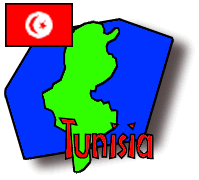topics: brik (food), environment, Bizerte, wildlife, Utique (Utica), mosaics, Punic tombs; jump to dispatch
BikeAbout Log

Rider Notes: October 19–20, 1997
Breakfast: Once again, a simple breakfast of pastries. This morning, in addition to the regular pain au chocolate and croissants, we picked up a "UWP" — unidentified warm pastry — which turned out to be a little olive-and-shrimp sandwich. Maybe not a great combination for breakfast, but we'll keep it in mind for lunch sometime.
Lunch: When we returned to Tunis after our ride to Bizerte, Anthony and Padraic struck out on their own in search of lunch. They happened upon a very small, very simple place just a few blocks from their host's house. The food looked good, but communication was a problem. The waiter's French was almost as bad as Padraic and Anthony's Arabic. Anthony asked the waiter what was on the menu, but it wasn't quite clear the first time, so Anthony asked again. The second time he asked, the waiter assumed they were ordering. They ended up with everything on the menu! Chicken, veal, spaghetti, lamb, and salad — all served at the same time. Luckily, it turned out that they had chosen well; everything was delicious.
Dinner: For dinner, we all had salads and couscous with vegetables (Anthony and Padraic had meat in theirs as well). Dessert was a large plate of fresh fruits — pears, apples, dates, pomegranates, and a fruit none of us could identify, but which we ate anyway. It was yellow-orange in color, had the consistency of a mango, and tasted unlike any fruit we've ever had before — neither tangy nor sweet, but good.
Food of the Day: Brik thon
The Tunisian specialty, brik, is a large triangle of very light, very flaky pastry with an egg (usually surrounded by some sort of meat) inside. The chef pokes a hole in the pastry and sticks in the egg and meat, then folds it over and fries it in oil. The brik that we had for dinner had tuna fish around the egg (thon means "tuna" in French), but it can contain any sort of fish or meat.
Person of the Day: Blanche Gelber (Ethan's mom)
On October 19, Blanche celebrated a birthday. Ethan was not able to call on that day because he was not near any working international telephones, but he was thinking of her and wishes her, a little late, the very best of days. Blanche, with Sam (Ethan's dad), is just beginning to learn about the Internet so that she can follow the adventures of BikeAbout. BikeAbout encourages all people, no matter how young or old, to get online and experiment with the special and unique capabilities of the Internet. It is never too late and not as intimidating as it might seem! Anyway: HAPPY BIRTHDAY, BLANCHE!
Place of the Day: Ichkeul National Park 
The Ichkeul National Park, on lovely Lake Ichkeul, is a UNESCO World Heritage site and listed by the Ramsar Commission as one of the most important wetlands in the world. Ichkeul National Park is so important, because it is one of this hemisphere's main winter quarters for migratory waterfowl. Hundreds of thousands of geese, ducks, and other birds call Ichkeul home during the winter months. Without Lake Ichkeul, these birds would have no place to go. Unfortunately, Lake Ichkeul is one of the properties that the World Heritage Committee has listed as a world heritage site in danger as a result of "significant deterioration of the characteristics for which the site was inscribed." In particular, environmentalists have noted that the building of three dams has cut off much of the fresh water that could reach the lake. As a result, the salinity , or salt content, of the water has increased and many species of plants have died out and the birds that relied on those plants have had to go elsewhere. We hope that this precious resource may be saved.
Group Dispatch, October 19–20

While Ethan remained in Tunis to attend some important meetings, the rest of the group jumped on a train to the port city of Bizerte, some 65 km (41 mi) north of Tunis. Because of its large natural port, Bizerte has been coveted by practically every civilization that has ever been in Tunisia, from the Berbers to the French. The Romans, who called the city "Hyppo Diarrhytus," used the port to export back to Rome the grain and other foodstuffs from the fertile hills and plains of Northern Tunisia, an area known as the "bread basket of Rome." The French valued the port so much they refused to give it up at the end of the colonial period; the Tunisians only recovered it in 1963 (seven years after Tunisian independence), after a series of bloody battles between Tunisian and French troops. Judging from the dozens of soldiers and sailors walking around Bizerte during our visit, Tunisia obviously still considers the port an important military location.
After finding a place to stay and rescuing our bikes from the train station (they had to take a later train than the people), the BikeAbouters spent the rest of the day walking around Bizerte, visiting its small, but lively medina and watching the busy boat traffic in and out of the port.  Because we had a big day planned for Monday, we all went to bed soon after dinner, instead of checking out Bizerte's nightlife.
We woke up at 6 a.m. and were on the road shortly after 7 (we're already back on our Moroccan bike schedule!). Our first stop was the Ichkeul National Park (see the Place of the Day), about 20 km (12.5 mi) out of Bizerte, near the town of Mateur. We arrived at the wrong time of year to see many birds (the best time to go birdwatching is the spring), but we did soak up the beautiful scenery. Lake Ichkeul is the last of a chain of salt lakes that used to extend all the way across North Africa. Surrounded by mountains and marshland, the lake is well worth a look even without its feathered visitors. After some sightseeing and filming, we turned south and east to return directly to Tunis.
Despite some annoying traffic, including a lot of big trucks, the ride from Lake Ichkeul back to Tunis was easier than expected. The flat road and our joy in finally getting back on the bikes helped the kilometers zip by. Noticing that we were ahead of schedule, we took a short detour to see a small, but well preserved archaeological site just outside of the little town of Utique.
Utique
Because we had a big day planned for Monday, we all went to bed soon after dinner, instead of checking out Bizerte's nightlife.
We woke up at 6 a.m. and were on the road shortly after 7 (we're already back on our Moroccan bike schedule!). Our first stop was the Ichkeul National Park (see the Place of the Day), about 20 km (12.5 mi) out of Bizerte, near the town of Mateur. We arrived at the wrong time of year to see many birds (the best time to go birdwatching is the spring), but we did soak up the beautiful scenery. Lake Ichkeul is the last of a chain of salt lakes that used to extend all the way across North Africa. Surrounded by mountains and marshland, the lake is well worth a look even without its feathered visitors. After some sightseeing and filming, we turned south and east to return directly to Tunis.
Despite some annoying traffic, including a lot of big trucks, the ride from Lake Ichkeul back to Tunis was easier than expected. The flat road and our joy in finally getting back on the bikes helped the kilometers zip by. Noticing that we were ahead of schedule, we took a short detour to see a small, but well preserved archaeological site just outside of the little town of Utique.
Utique 
 (or Utica as it is sometimes written and always pronounced) was the earliest Phoenician trading post in Tunisia, established around 1101 BC (BCE). It then became an important Punic city until the fall of Carthage (the Punic capital) in the 2nd century BC. The Roman conquerors made Utica their provincial capital. The site now consists mostly of ruins from the Roman era. We were also interested to discover that Utica used to be a seaport, but over the years the Mediterranean has actually receded a few kilometers and left a long stretch of land between the city and the coast.
As our first visit to ancient ruins, we didn't know what to expect. We were excited to see so much of it still intact. The walls of many of the houses were standing, the sewer system looked as if it were still working, and some of the mosaics had been preserved. Considering that most of the buildings had been built during the 1st Century AD (CE), we were all impressed by Roman engineering. How many of our buildings will still be around in 1,800 years, we wondered?
Perhaps the most interesting part of the site however, was the spooky Punic burial ground just outside of the walls of the settlement. Some of the tombs — for people who had died over 20 centuries before — were still entirely intact! andrEa thought she saw some ghosts. Or perhaps those were just the shadows of the German tour group that entered the site just after we did. We've seen so few tourists on our travels so far that it was strange to see a whole busload of them at once.
After taking more pictures, we hopped back on the bikes and rode into Tunis. We stopped once in a strange little café out in the middle of nowhere.
(or Utica as it is sometimes written and always pronounced) was the earliest Phoenician trading post in Tunisia, established around 1101 BC (BCE). It then became an important Punic city until the fall of Carthage (the Punic capital) in the 2nd century BC. The Roman conquerors made Utica their provincial capital. The site now consists mostly of ruins from the Roman era. We were also interested to discover that Utica used to be a seaport, but over the years the Mediterranean has actually receded a few kilometers and left a long stretch of land between the city and the coast.
As our first visit to ancient ruins, we didn't know what to expect. We were excited to see so much of it still intact. The walls of many of the houses were standing, the sewer system looked as if it were still working, and some of the mosaics had been preserved. Considering that most of the buildings had been built during the 1st Century AD (CE), we were all impressed by Roman engineering. How many of our buildings will still be around in 1,800 years, we wondered?
Perhaps the most interesting part of the site however, was the spooky Punic burial ground just outside of the walls of the settlement. Some of the tombs — for people who had died over 20 centuries before — were still entirely intact! andrEa thought she saw some ghosts. Or perhaps those were just the shadows of the German tour group that entered the site just after we did. We've seen so few tourists on our travels so far that it was strange to see a whole busload of them at once.
After taking more pictures, we hopped back on the bikes and rode into Tunis. We stopped once in a strange little café out in the middle of nowhere.  It was a nice pause before the last few kilometers into Tunis. Picking our way through the crazy traffic of this big city was scarier than any ghosts, but we all made it safely. Ethan greeted us warmly. The poor guy was lonely all by himself.
It was a nice pause before the last few kilometers into Tunis. Picking our way through the crazy traffic of this big city was scarier than any ghosts, but we all made it safely. Ethan greeted us warmly. The poor guy was lonely all by himself.

While andrEa, Anthony, Corinne, and Padraic were winding their way through the green hills north of Tunis, Ethan remained in the capital city and worked to arrange exciting events for the whole team once they were all reassembled. Along the way, Ethan, although he missed the others, had some enjoyable adventures of his own.
October 19. The Tunis home in which the BikeAbout team is being housed belongs to Ethan's Tunisian friend, Mongi. Unfortunately, Mongi was away while the BikeAbout team was around, his family-in-law, living right next door, made everyone feel right at home. On the 19th, the mother, father, son, and daughter invited Ethan for a delicious Tunisian fried fish and couscous lunch in their home. Together they spent many, many hours discussing Tunisia and Tunisian culture, from the geography and climate to the language and culture. The family had a small collection of ceramic figurines — a traditionally-dressed mother and father, some musicians and artisans, and a man in a hammam (Turkish bath) — that inspired great conversation and gave Ethan an excellent introduction to Tunisia. BikeAbout would like to thank them for their hospitality and generosity during their stay in Tunis.
October 20. Ethan contacted a bunch of groups and associations and arranged for late-afternoon meetings that he thought he would have to attend alone. Fortunately, the rest of the group cycled swiftly and returned in time for most of them.
First there was the Fédération Sport pour Tous (Sports for All Federation). The Director of the Federation, Mr. Belhassan Lassoued  , welcomed BikeAbout to Tunisia and told of a special event, a United Nations-sponsored journée cycliste (bicycling day) that would be happening in the nearby resort town of Hammamet. As it turned out, Hammamet is on the BikeAbout itinerary and the ride will take place on precisely the same day that the BikeAbout team will be there! What incredible luck! The Federation, which works with the UN and UNESCO to raise awareness about the importance of sport in our lives, seemed to have anticipated BikeAbout's arrival and designed an event perfect for us! Look for our dispatch from Sunday, October 26 for our report on the day's events.
Then there was the Association Tunisienne de Communication Extérieure (Tunisian Association for Communication with the Exterior). Essentially an information office for foreign journalists or exchange groups, ATCE generously offered to help BikeAbout gather information about Tunisia. Madame Bochra Malki, though busy arranging an important theater festival, took time to provide us with mountains of information about Tunisia and Tunisian culture, as well as give us contacts that we might find useful throughout our stay in the country.
, welcomed BikeAbout to Tunisia and told of a special event, a United Nations-sponsored journée cycliste (bicycling day) that would be happening in the nearby resort town of Hammamet. As it turned out, Hammamet is on the BikeAbout itinerary and the ride will take place on precisely the same day that the BikeAbout team will be there! What incredible luck! The Federation, which works with the UN and UNESCO to raise awareness about the importance of sport in our lives, seemed to have anticipated BikeAbout's arrival and designed an event perfect for us! Look for our dispatch from Sunday, October 26 for our report on the day's events.
Then there was the Association Tunisienne de Communication Extérieure (Tunisian Association for Communication with the Exterior). Essentially an information office for foreign journalists or exchange groups, ATCE generously offered to help BikeAbout gather information about Tunisia. Madame Bochra Malki, though busy arranging an important theater festival, took time to provide us with mountains of information about Tunisia and Tunisian culture, as well as give us contacts that we might find useful throughout our stay in the country.
Questions? Ask Padraic  !
!



Copyright 1997-2004 BikeAbout. All rights reserved.
![]()


![]() !
!




